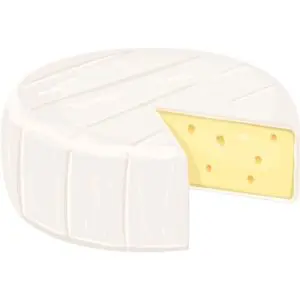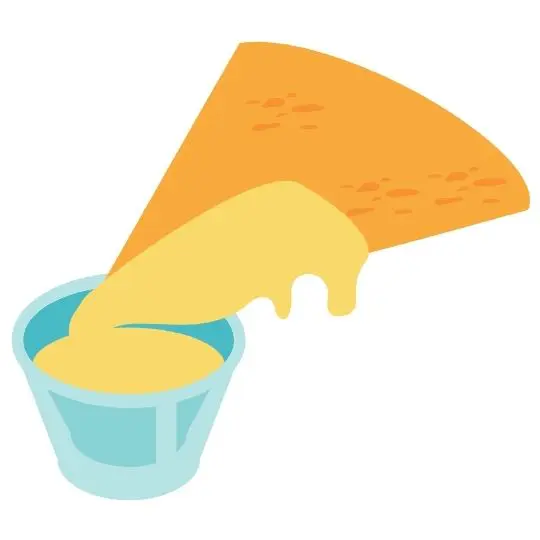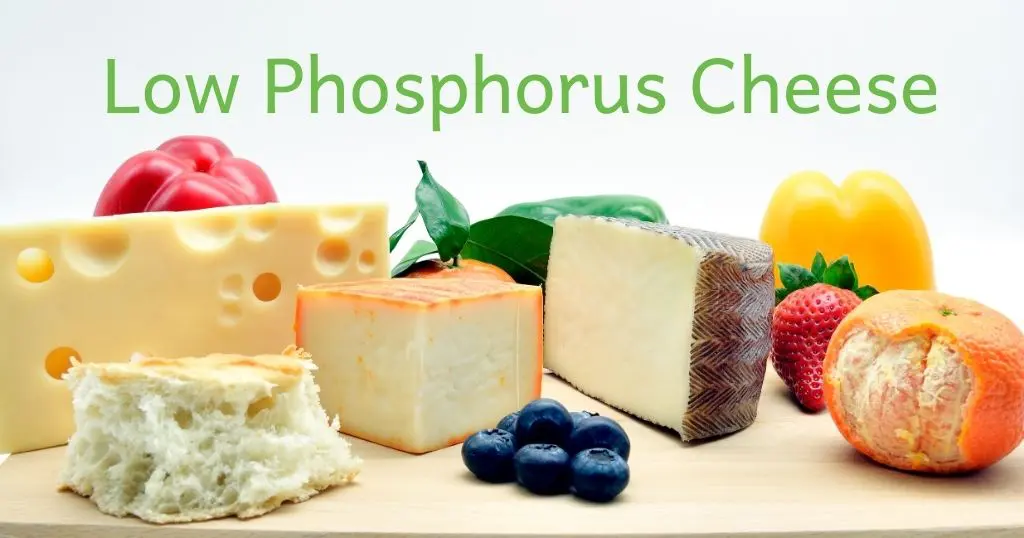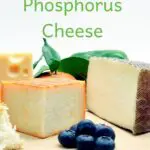Who doesn’t love cheese!? Whether it is cheese on a sandwich, a cheesy sauce, string cheese or a fancy French cheese plate, cheese is truly one of my favorite foods. But, does low phosphorus cheese exist? Is cheese a kidney friendly food?
Let me help clear this up for you.
Table of Contents
Cheese On a Renal Diet
So, can you eat cheese on a kidney-friendly or low phosphorus diet? I have great news for you – yes! Cheese can fit into a healthy diet for kidney disease. But, there are a few things to keep in mind.
Absorption of Phosphorus in Cheese
Our bodies absorb phosphorus differently from different foods. Our bodies absorb very little phosphorus from plant foods such as whole grains, beans and nuts. On the other end of the spectrum, we absorb about 90% of phosphorus from meat, poultry and fish.
In terms of phosphorus absorption, dairy and cheese are closer to meat. We absorb about 80% of the phosphorus in cheese.(1) Because of this, cheese can contribute a large phosphorus load if you are not careful.
Portion Size of Cheese
To help control how much phosphorus you eat, portion size is key! Even a low phosphorus cheese can become a high phosphorus cheese if you eat a lot of it. Most of the phosphorus amounts in the table below are for a 3/4 ounce serving size. This is about 1 slice of cheese, or a chunk the size of 3 dice.

Phosphorus Additives in Cheese
While 80% of the phosphorus in cheese is absorbed, nearly 100% of phosphorus is absorbed from phosphorus food additives. Some cheeses have phosphorus food additives in addition to the phosphorus that naturally occurs in cheese. Cheeses with phosphorus additives should be avoided.
In general, highly processed cheeses are more likely to have phosphorus food additives. These cheeses also tend to be higher in sodium. Some common highly processed cheeses are:
- American Cheese (white & yellow)
- Nacho Cheese Sauce
- Velveeta Cheese
- Canned Cheese
- Macaroni & Cheese made from a box or powder
Understand more about how to find phosphorus food additives.

Sodium in Cheese
Remember that a low phosphorus cheese isn’t necessarily a healthy choice for a renal diet. Cheese can be very high in sodium too.
Make sure to account for the sodium in cheese in your daily total. People who have kidney disease should limit sodium to 2,300mg per day.(2) Staying below 2,300mg of sodium might be difficult if you eat large amounts of very salty cheeses like feta, Asiago or Parmesan.
Potassium in Cheese
Potassium is a mineral that some people with kidney disease need to limit. Because cheese is made from milk, and milk is high in potassium, many wonder about potassium in cheese.
Most of the potassium in milk is lost during the processing of cheese. And, a portion of cheese in much smaller than a glass of milk. Because of this, most cheeses are relatively low in potassium. However, be careful of portion size here too. Large amounts of cheese can add up!
Different Phosphorus Needs For Different People
The most important thing to remember about a kidney friendly diet, is that it must be individualized. What is healthy for one person with kidney disease, might not be for someone else. How much phosphorus you should eat is based on your lab values.
For people with kidney disease, eating too much phosphorus can increase the risk of heart disease and weak bones. High phosphorus levels are even associated with faster progression of kidney disease and death.(3)
Always as you doctor or dietitian what is best for you based on your lab results and medical history.
Low Phosphorus Cheese
The amount of phosphorus in cheese varies quite a bit. Phosphorus ranges from 15mg up to 160mg per standard portion size of cheese. So, what cheeses are considered a “low phosphorus cheese”?
Check out this table to find your favorite cheese! Remember, the nutrition values provided are just a guide. The specific amounts of a nutrient can vary widely based on the brand of cheese you buy. Always make sure to check the nutrition facts label – especially for sodium! And, don’t forget to check for those phosphorus additive ingredients.
| Serving Size | Sodium | Potassium | Phosphorus | Calcium | |
|---|---|---|---|---|---|
| American | 3/4 oz | 269 | 62 | 161 | 289 |
| Blue or Roquefort | 3/4 oz | 241 | 54 | 81 | 111 |
| Brie | 3/4 oz | 132 | 32 | 40 | 39 |
| Cheddar | 3/4 oz | 137 | 16 | 96 | 148 |
| Chihuahua | 3/4 oz | 131 | 11 | 97 | 138 |
| Colby | 3/4 oz | 128 | 27 | 98 | 146 |
| Cotija | 3/4 oz | 330 | 16 | 97 | 150 |
| Cottage Cheese | 1/2 cup | 337 | 126 | 156 | 108 |
| Cream Cheese | 1 oz | 89 | 37 | 30 | 28 |
| Edam | 3/4 oz | 207 | 40 | 114 | 155 |
| Farmer's Cheese | 1/2 cup | 312 | 103 | 158 | 82 |
| Feta | 3/4 oz | 242 | 14 | 72 | 105 |
| Fontina | 3/4 oz | 168 | 13 | 73 | 116 |
| Fresco | 3/4 oz | 160 | 27 | 82 | 120 |
| Havarti | 3/4 oz | 160 | 9 | 86 | 122 |
| Goat (chevre) | 3/4 oz | 87 | 33 | 79 | 63 |
| Gouda | 3/4 oz | 174 | 26 | 116 | 149 |
| Gruyere | 3/4 oz | 150 | 17 | 127 | 212 |
| Mascarpone | 1/4 cup | 25 | 77 | 48 | 54 |
| Monterey (or Pepperjack) | 3/4 oz | 126 | 17 | 93 | 157 |
| Mozzarella | 3/4 oz | 147 | 24 | 112 | 146 |
| Muenster | 3/4 oz | 132 | 28 | 98 | 151 |
| Nacho Cheese Sauce | 1/4 cup | 522 | 19 | 99 | 116 |
| Parmesan | 3/4 oz | 372 | 39 | 135 | 188 |
| Provolone | 3/4 oz | 153 | 29 | 104 | 159 |
| Ricotta | 1/4 cup | 63 | 110 | 106 | 153 |
| Romano | 3/4 oz | 305 | 18 | 161 | 227 |
| Substitute, almond based | 3/4 oz | 141 | 15 | 13 | 185 |
| Substitute, cream cheese | 1 oz | 160 | 41 | 13 | 29 |
| Substitute, mozzarella | 3/4 oz | 144 | 96 | 122 | 128 |
| Substitute, rice based | 3/4 oz | 141 | 5 | 2 | 185 |
| Substitute, soy based | 3/4 oz | 185 | 25 | 12 | 6 |
| Substitute, tapioca based | 3/4 oz | 188 | 2 | 8 | 2 |
| Swiss | 3/4 oz | 40 | 16 | 126 | 195 |
Happy Eating!
Melanie



do they have to say ion the label f they have the additives. and if so is that also for bulk cheese
Yes – ingredients must be listed on all products that require a nutrition food label (basically, anything but fresh produce or meat). Just look for those “phos” ingredients!
I’m trying to find out if full fat dairy , such as ricotta, has more phosphorus than fat free or light? I know the additives make a difference and fat free and light often have more additives of several things. Thanks !
It would probably truly depend on the brand! Each brand will have different additives, which are really the biggest concern when it comes to phosphorus!
I would like to know how homemade cheese is evaluated, since commercial cheeses have lots of additives.
Thx
Yes – making your own cheese at home would be a great way to avoid phosphorus additives in commercial cheese. Milk itself has a fair amount of phosphorus in it, so it would not be phosphorus-free. However, it would likely be lower than some commercial cheeses. It would also be a great way to control how much salt is in the cheese too!
What about baby Swiss?
I would imagine the nutritional content of baby Swiss is the same as regular Swiss listed in the table!
I checked the phosphorus content of fresh mozzarella and it looks like it might be quite a bit lower than the low moisture. Am I right? I’m taking a binder and still have high phosphorus labs. Love cheese.
Mineral levels (like phosphorus) are going to be widely different based on brand. I’d check whatever kind of mozzarella you buy and be especially diligent about those phosphorus additives!
I hope my comment didn’t seem critical or snarky! I wish that your information is correct! I would love for it to be correct!
Why do different websites give different values for phosphorus? For example, you say that goat cheese is 79 mg. This other site (https://fdc.nal.usda.gov › fdc-app) says its 256 mg. Just bought goat cheese. Who do I trust, you or the FDA?
The specific mineral levels in different cheese will vary DRAMATICALLY from product to product. I use the USDA for my nutrition information. You can find different mineral amounts even on the same site depending on which search result you choose. Your best bet is to always avoid those phosphorus additives!
If ‘phos’ is in the list of ingredients I don’t buy it. But there is no listing of phos required like protein, fats, sodium. I wish it were. I’ve been told it varies by brand, so I looked up Kirkland soft goat cheese and could not find a site that listed it.
Thank you so much for posting this. Great information and very helpful! My son’s labs just came back elevated BUN and he often shows increased self abuse(he’s severely autistic) when his BUN levels are high. He’s also suffered with kidney stones in past so I was researching best foods to keep kidneys healthy and came across your site. MUCH appreciated. I was getting depressed looking at the no cheese options on other sides. My son loves cheese. Thankfully, I saw Brie, cream cheese and Marscipone on list of lower phosphorus cheeses ‘least likely to mess with kidneys.’ My son loves these! The challenge of treating patients with autism, such as my son, is that most autistic behaviors are rooted in underlying acute medical issues or acute or chronic untreated issues that were overlooked. Thousands of people with autism have been given antipsychotics for aberrant behaviors when really all the time they were acting our was a cry for help.
Thank you for sharing! I’m so glad this information will help your son enjoy some of his favorite foods.
It would be soooo helpful if you would name the BRANDS of cheese that are the lowest in phosphorus and salt, and potassium Thank you
Hi Claryre! The amount of phosphorus in different brands is widely variable, and honestly change all the time. It would be impossible to maintain a list like this. My best advice is to first, avoid cheeses with phosphorus additives. And then, use a list like this to know the types of cheese that tend to be lower in phosphorus. Hope that helps!
Hello,
Thank you for the helpful tips but what about sheepsmilk cheese? Hnmmmm?
Basque cheese. What about a Basque diet? Any thoughts?
Hi Jeanne,
Like all cheese, phosphorus for sheepsmilk cheese would depend how it is made and the brand. As far as dietary patterns, like the “Basque diet”, the answer will really be different for everyone. If you enjoy the foods on this dietary pattern, they can definitely be incorporated into a kidney friendly diet for you!
Don’t see Swiss cheese on the table
Hello! Swiss cheese is included on the table.
Why is cottage cheese good on a CKD diet when it is so high in phosphorus?
Hi Renee! I shared the phosphorus amount for many types of cheeses for you to compare. Cottage cheese is one of the higher phosphorus options.
With all of this information, I’m learning a lot. I appreciate it.
Kathy Reyes
Why can I cheese.
Melanie thank you for including the substitute cheeses! There are some good ones on the market and it is good to see they fit into our lab values. Great article.
Thank you so much Kandy!
What about Dialya cheese?
I’d check the label! The few Daiya products I just spot checked had phosphorus additives!
Thanks, this is so helpful.